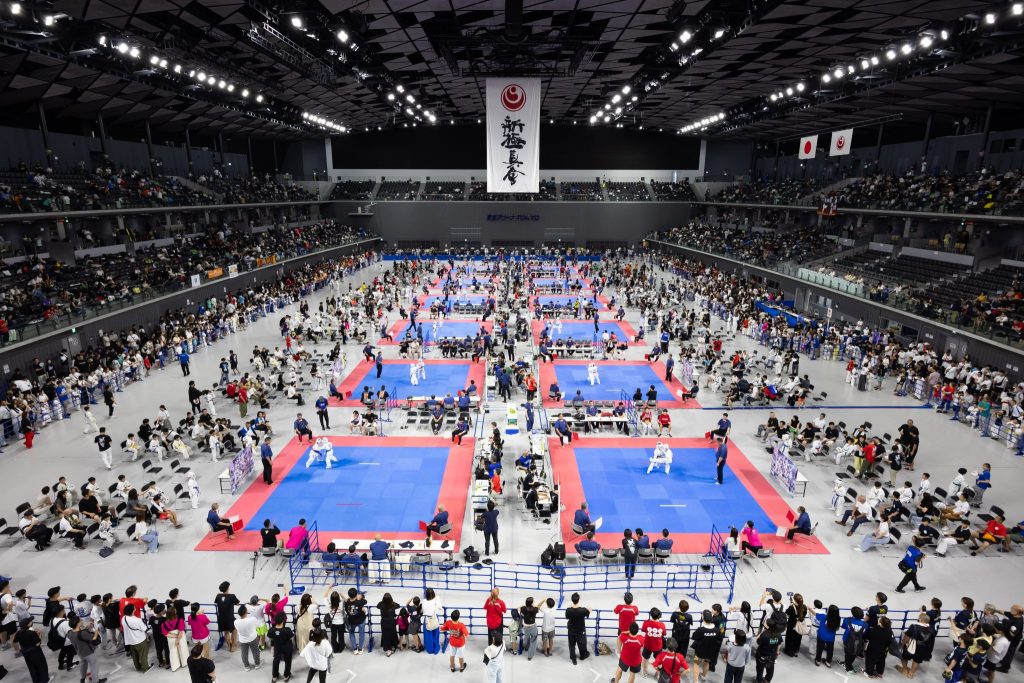I sincerely thank all of you for your ongoing support in the growth and development of WKO.
Here in Japan, summer is in full swing. The sound of cicadas echoes through the trees, stirring our spirits as we head to the dojo. Across Europe and many other regions, summer camps are in full bloom. It fills us with great joy and a sense of global connection to know that, somewhere in the world right now, people of all ages are wearing white dogi under the sun—punching, kicking, and shouting with all their might.
On a more somber note, we were deeply shocked by the massive earthquake and tsunami that struck off the coast of the Kamchatka Peninsula in Russia yesterday. Reports indicate damage to coastal factories in the region, and even here in Japan, tsunami warnings were issued. We extend our heartfelt sympathies to those affected and pray for the safety of everyone living nearby. With aftershocks expected, we hope everyone will continue to stay safe.
Two months have passed since the 1st World Fullcontact Karate Championship held at the end of May. As the excitement and emotion of that event quietly settle into our daily lives, WKO is already stepping toward its next challenge.
On July 19–20, the Japan Region hosted the Karate Dream Festival 2025 National Championship, which brought together a total of 3,273 competitors. A fierce battle unfolded across 222 categories. Particularly noteworthy was the All Japan Kumite Championship for elementary, junior high, and high school students, where top athletes who had won their regional qualifiers clashed from the very first round. With the introduction of a qualification-based system, the level of competition and intensity reached unprecedented heights.
This initiative represents WKO and Shinkyokushinkai’s pursuit of “strength-based identity” and is a core part of our development strategy in an increasingly diverse full-contact karate landscape. In the senior kata and kumite divisions, seasoned competitors showcased refined techniques and remarkable composure, demonstrating the unique value of experience and maturity.
Supporting a tournament of this scale requires highly efficient operations. This year’s Dream Festival introduced new systems for online match progression management, 12 venue display monitors, and smartphone integration. These innovations not only reduced the workload on staff but also helped manage the movement of nearly 20,000 attendees. The systems were adapted from proven European technologies and optimized for Japan’s mega-tournament format. The layout and flow of the venue were designed with the image of an “international hub airport” in mind, creating a space that was both comfortable and sophisticated.
Looking ahead, the 57th All Japan Karate Championship will be held in October, with entries continuing to arrive from around the world. This tournament adopts an open format, welcoming overseas athletes and serving as a stage where we can truly feel the growth of karate as an international sport.
In this event, we have made an exception to allow Russian karateka to participate. In early June, we met with Shihan Yuriy Shabanov and Shihan Leonid Ilyushkin and listened to their voices of hardship and hope, having kept their dojos alive amid prolonged international isolation. We also exchanged views with representatives from the Ukrainian branch and other European countries, which reminded us once again of the pain of war and the difficulty of maintaining sports free from political influence. This decision, while based on the WKO Board’s resolutions since the 13th World Championship (2023), aims to cautiously explore paths for reconnection through a domestic event. We are deeply grateful for the understanding of all involved.
From South America, we are also expecting participation from Brazil (newly appointed Shihan Isami Nishimura’s Branch), with Mr. Victor Ryu Nishimura set to compete. As a rising hope for the next generation in South America, we are looking forward to his strong performance.
Lastly, as full-contact karate continues to grow globally, the standardization of competition and strengthening of the referee system will become increasingly important. Building upon the many lessons learned from the 1st World Championship, we will continue to promote the systematization of referee training across the globe. Just as athletes train with all their might, referees too must study and prepare themselves thoroughly.
Karate is not only a sport—it is a culture, and a bridge that connects people. As practitioners in this era, we wish to be agents of dialogue and understanding, with eyes open to the world’s challenges. Through full-contact karate, we will continue to walk forward with pride and responsibility, striving to contribute to global harmony.
Osu,
Kenji Midori
Representative, World Karate Organization (Shinkyokushinkai)
End of July 2025

